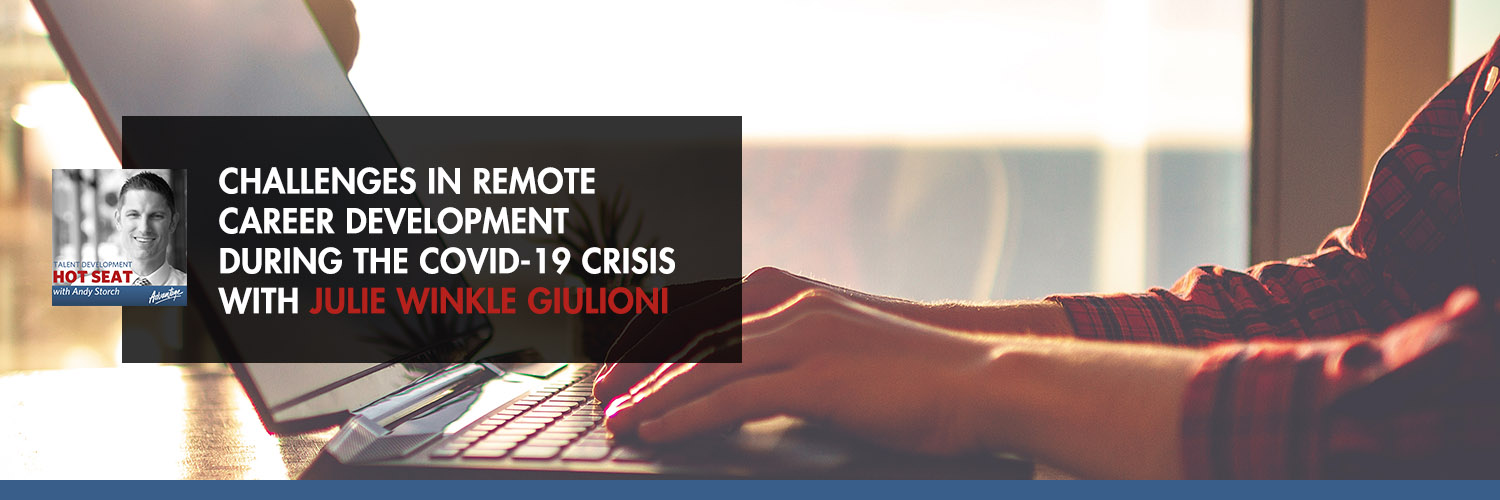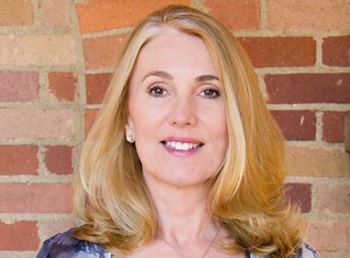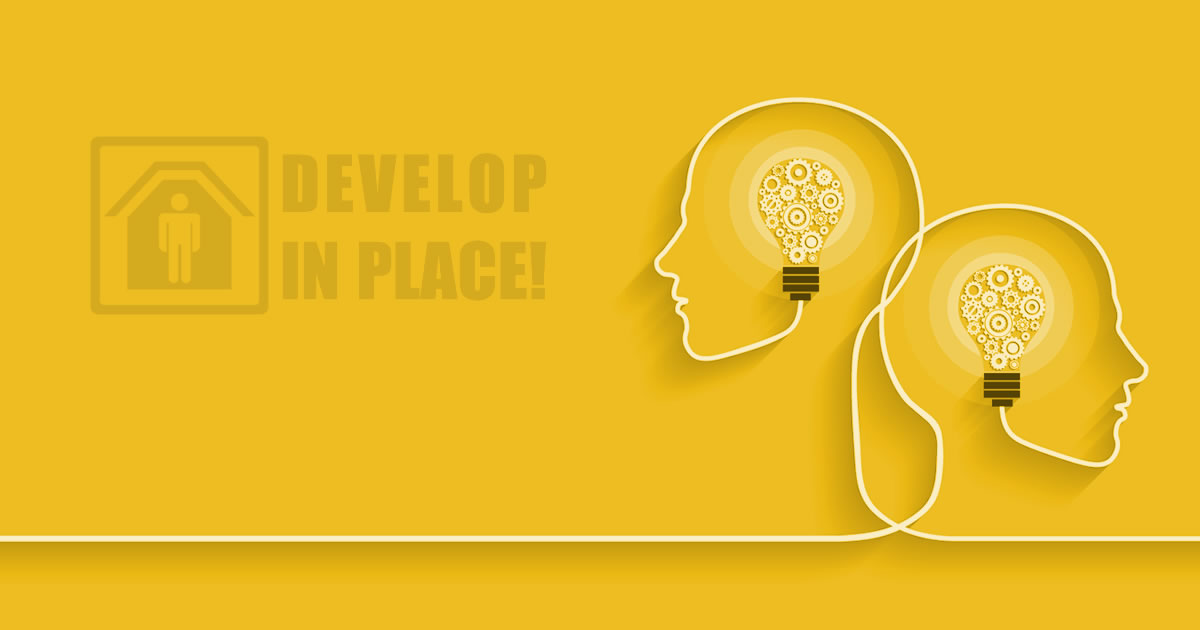
Challenges in remote career development during the COVID-19 crisis
In the Hot Seat: Julie Winkle Giulioni discusses why career development is critical right now
The most powerful investment we can make right now is in our development, growth, and learning.”
Do you feel like your career development is on pause? You are not alone, as everyone apart from the essential workforce is now forced to work remotely. Julie Winkle Giulioni, author of the international bestseller Help Them Grow or Watch Them Go: Career Conversations Employees Want, is back in today’s episode with Andy Storch to discuss the importance of helping employees grow while working from home. She argues that remote career development is all the more relevant today not only because it prepares us for an uncertain future, but also because it helps us get through the stressful conditions we are all experiencing today.

Listen to the podcast here:
Challenges in remote career development during the COVID-19 crisis with Julie Winkle Giulioni
The importance of employee development to help them grow and why it is critical while everyone is working remotely
I'm excited that you're joining me for a conversation with my friend, Julie Winkle Giulioni. Julie helps organizations enhance learning, engagement, retention and the bottom line. She is an author, a speaker and as a consultant. You may know her as the author of the book, Help Them Grow Or Watch Them Go. You might also remember that Julie was on this show talking about her book and some of the work she's done around helping organizations develop their people, especially in the career and employee development space. I've invited Julie to come back on the show to talk specifically about giving employees development during these challenging times under Coronavirus or COVID-19, where many people are working remotely. I'm excited to have Julie on the show to talk about that, as well as a little preview of an upcoming webinar she's got coming up with us on Thursday, April 16th at noon Eastern. Julie, welcome back to the show.
---
I'm excited that you're joining me for a conversation with my friend, Julie Winkle Giulioni. You may remember Julie was on the show a while back talking about her book, Help Them Grow Or Watch Them Go, some of the methodologies around that and the reasons why it's important to give development to our people. It was a great interview. We had a lot of great feedback on that. I wanted to have Julie back on because first of all, it's been a while. Second of all, we are in interesting times with COVID-19, forcing everybody to work remotely. I know Julie has done a lot of work to help people, not only companies develop their people and keep them engaged, but also do it remotely, digitally, virtually and all those things. This would be a great and timely conversation. Julie, welcome back to the show.
Thanks, Andy. I am delighted to be with you.
It is great to have you on. We have developed a great friendship over the last year or so since you've been on and we talk all the time. I reference your book and some of the things you talk about often. I know you speak and do learning design. You're an expert on this whole idea of employee experience and employee engagement. Things have changed a lot in the last couple of months. Before we get to everything going on with Coronavirus and working remotely, let's start with a quick intro. Who are you? What do you do? We'll get into some stuff about employee development.
I'm an author, speaker and consultant on the topic of career development, engagement and leadership development. I work with organizations worldwide, helping people realize their potential. I also do a lot of instructional design work, helping organizations figure out how to deploy the right learning to the right people in the right way in order to move the needle and realize business outcomes. That's certainly important now as it has been before.
Why career development is important
Let's dig into how important that is because we know it's critical. I think a lot of our readers do as well, but for the couple that don't, why is development important more than it ever has been before?

Remote career development: We want employers to provide some great opportunities and options to employees, but employees also have the responsibility to their own career.
Development from my perspective is probably the most powerful lever that leaders and organizations have not only to build capacity for the individual in the organization, but it does so much more as well. We know from the research that career development leads to greater levels of engagement and job satisfaction. It leads to greater customer satisfaction, more discretionary effort, better retention, innovation, quality, the list goes on and on. When leaders can develop the ability to grow their people and the organizations can support that kind of development, it becomes the ultimate win-win.
It's easy to make a business case as well because it can improve results, innovation and retention. I'm seeing studies that the attrition of employees can cost up to $100,000 or more per employee. When you're losing a lot of employees, it could be millions of dollars. A lot of times, it's because they're not engaged. They don't feel like they're getting the development they need. In the old days, while salary, security and benefits were enough, we're hearing from people that they want to know that they're going to get some development opportunities. They're going to be able to learn and they're going to be able to grow. They're asking what type of person are they going to become. Not thinking about necessarily a long-term career or working in a place for twenty years, but what can they get? How are they going to grow? If they get that, there's a chance they may hang around. Are you hearing and seeing that as well?
Yeah. Career development is one of the top reasons people either stay, leave or come to an organization. Without a doubt, it's a powerful magnet for your top talent. As we look at the future, you're looking at new numbers around unemployment. We're looking at a very different employment landscape, perhaps, once we come out on the other side of this. The truth is that top talent is always going to be in demand. There's always going to be stiff competition. Organizations that are going to succeed are the ones who are investing in the development that will help to retain that talent.
There are a lot of great organizations out there that have been investing a lot in development. We are both lucky to work with many of them. A lot of times, that development is done in person. Classroom experiences, people traveling, getting together. There's a lot of engagement and networking that happens to improve the employee experience in the office, but we're in unprecedented times because of Coronavirus. Everybody around the world is working remotely other than the essential workforce. Everybody's trying to figure it out not only, “How do I get things done, but how do we develop our people and still give them these opportunities?” It's a challenge for a lot of people. I know you see it as an opportunity. I was looking at a quote I saw from you that said, “Sheltering in place offers a unique opportunity to look inward, make a commitment to improvement and growth and take deliberate steps now that will prepare us for future success.” Can you tell me more about that?
This is an unprecedented time. There's no way around that. When I look at the opportunity, the question is, how are we going to use this time? From my perspective, the most powerful investment we can make is in our development, our growth and our learning. Doing that, you've seen this time in that way is going to certainly prepare us for an uncertain ambiguous future. What it also does, an investment in and a focus on learning, it also addresses a lot of the challenges that many of us are feeling during this time of sheltering in place and working remotely. There's a lot of stress out there and rightly so. The nervous system regulates itself by having something that absorbs its complete focus. Learning is a great focuser for the mind.
[bctt tweet="The most powerful investment we can make right now is in our development, growth, and learning." via="no"]
You look at a lot of organizations are finding that their people have some excess bandwidth. People who can't go out and talk to customers or engage with suppliers like they used to might have some extra time on their hands. That could be constructively, strategically used toward learning. There's the whole need for connection. As we've had to go inward and remove ourselves from the physical workplace, there are a lot of folks who are feeling disconnected and feeling a little bit adrift. Learning, depending upon how it's deployed, can be a tool for creating that connection as well. From my perspective, learning and development is going to prepare us for the long haul, but it's also going to help us get through this.
Career development is a joint responsibility
Just because people are working from home, it doesn't mean they don't still want to learn and grow or they don't need it. Personally, I still invest a lot in learning and growth. I'm reading books every day, listening to podcasts, taking courses, and all the things that I want to do to continue to grow, which brings up a question in my mind that I've asked a few different people. Especially prescient, when you think about the need for learning, the investment of developing and learning for ourselves, whose responsibility is it to continue that? Is it the employees or is it their employer or the organization?
I think it's a joint responsibility. Certainly, the individual is responsible and accountable for the growth that they pursue or they don't. Yet, leaders can play a huge role in terms of supporting that, enabling it, carving out the space and offering the support that's required for folks to be able to grab their development and move it forward. The organization has a role in terms of creating a hospitable environment that enables it. When I think about COVID-19, one of the most powerful lessons I think we're all walking away with is that we're all in this together. When it comes to development, I see it that way too. We're all in this together, working together to help each individual optimize their learning, knowledge and ultimately, their performance and contribution.
We want employers to provide some great opportunities and options to employees, but employees also have the responsibility to own their career and development. With that in mind, this is something that I care a lot about and I'm writing a book about it. You've got a great book in this space. What do you think are some things that people, individuals or employees of big companies that are working remotely but still want that development, what should they be doing to continue to own their careers and development?
The ownership becomes more important now because in the past, much of the learning was in person and that's gone away. Also, in the past, a lot of the learning was organized for the employee. As business operations are shifting, as priorities need to adjust to the changing conditions, some of that organization serving it up to the employee might not be happening the way it did before. That sense of autonomy and entrepreneurship almost when it comes to one’s development becomes important. The first thing probably is that employees, all of us, need to figure out how to find the time to do the development that's going to serve them now and let the foundation for later.

Remote career development: Take advantage of your free time to pursue activities that promote learning and growth.
There are lots of ways of thinking about that. One is to create a learning routine and it sounds like you have that in place long before this. Establishing a sense of normalcy can be supported by routines and learning is a great routine for creating that sense of cadence and predictability. I know for myself, at lunchtime each day, I sit down and I read one of the articles that I had clipped and stuck in that ever-growing pile. Before I go to bed at night, I'm doing a course. I do a short segment of that. That routine can be a powerful tool, not only to get in the habit and continue the learning, but to settle ourselves during this time.
I think there's a lot of importance to consistency and scheduling things in because we live in a world of constant demands. Most people are in reaction mode throughout the day. We're always getting emails, texts and social media notifications. There are many things to react to. If you don't schedule it in intentionally like you would a meeting or anything else, then a lot of times it doesn't happen. I've got it built into my routine for many years. I get up very early for a morning routine and that includes reading for 15 or 20 minutes or a little bit more every morning around 5:00 AM when there are not any distractions. Kids are sleeping, no phones ringing, that kind of thing. If I'm taking courses, and I am in one for the book, it's blocked off once a week for an hour and a half or I'm working on that. I can't schedule anything else over it. That's why I think a lot of people make the mistake as they don't prioritize the learning, the development, whatever activity it may be. They don't ever make time for it.
That scheduling and having the routine, that's one piece of it. There is that other side of the coin too. Especially given the new working situations that a lot of people are facing, there are a lot more potential ad hoc opportunities for growth and development. Those lulls that we hit during the day. I don't know about you, but mid-afternoon I hit that low energy period where I'm feeling a little bit distracted, a little bit burned out. Learning can be a great alternative to making another trip to the refrigerator and packing on the COVID-1915 that most of us are grappling with. Mining those spare moments, I've worked remotely for many years. I was doing it before it was in vogue. Great things are associated with that.
With other family members in the house with that overland anxiety that's operating, I find that I've got these weird little lulls of time, these minutes in between things that can either be frittered away going back to CNN to see the same articles I looked at, or I can use that as an opportunity to click in and watch an eighteen-minute TED Talk. There's a way to balance both the structure and the routine. I was reading something, and you probably already are aware of it, but the average American spends 100 minutes a day commuting. Many of those folks have traded that 100-minute commute for a quick walk from the bedroom to the dining room. We've got some extra bandwidth and I go back to the question, how are we going to use this time? I say develop.
Making learning available
Some people have extra time, some people have less time because of kids and whatever's going on. Either way, prioritizing your time and thinking about how you're spending it, where you're spending it and when you're going to do the things you're going to do is critical, which is why I spend that time in the morning not only reading but also I take out a journal and plan my day and the important things I want to get to. I make sure I'm ready for the schedule coming up. I always encourage people to do that because it's important. Both of us are big proponents of that. Let's get to the organization side as far as providing development opportunities to people. Some organizations were ready for this and had a lot of digital virtual options, but some were not. For those that are either not or in the middle, what should they be thinking about doing to start to provide more options to employees who are no longer in the office and can't travel?
[bctt tweet="We’re all in this together to help each individual optimize their learning, performance, and contribution." via="no"]
There are a lot of ways that organizations can pivot here to make learning available to their folks in a virtual way. From my perspective, what it boils down to is putting their money where their employees' minds are. Sticking to their guns, continuing to invest in learning and working with a couple of organizations who recognize they can't pivot quickly enough to make everything that people need available online immediately. They're offering a small reimbursement, a stipend for education that allows folks to own their career, find the learning that they need and get what they need. It sends such a powerful message to people that, “We're invested. It doesn't matter what's going on here. We know that learning is what's going to be the differentiator.” That's part of it. It doesn't have to be a programmatic shift. It's a maintenance of a mindset that plays out powerfully in terms of how dollars continue to be spent.
Another subtle thing is even how leaders and executives are talking during this period of time. Are the executives being transparent about the challenges, the actions they're taking, the mistakes, the failures and the lessons learned? Are they demonstrating a learning orientation and a growth mindset in the communication that is vital and powerful? How they talk about their own learning sets the example for how others should be thinking about theirs. The other thing to think about as an organization is how widely can you open the vault on all of the resources that you have. Many organizations have lots of on-demand resources, videos, other things that have been sorted and stratified for certain audiences, “You have to be a level XYZ to be able to access this or you have to reach this pinnacle to be able to get into that.”
Look at MIT opening the doors and giving everybody whatever they want in terms of their curriculum. What organization has the right to withhold anything at this point? Being a little bit more generous to make whatever is available more broadly available for folks to be able to take advantage of during this time is key. The migration to virtual, that's how I'm spending sixteen hours a day working with organizations, helping them strategize how to pivot and how to take that instructor-led experience. You're not going to be able to replicate all of the same effects and outcomes, but you can replicate an awful lot of the behavioral and performance outcomes. How do you do that swiftly so that you don't miss a beat and get people what they need as expeditiously as possible?
In this interview, you have referenced a couple of times a lull in the middle of the day like you had nothing to do. You also mentioned that you're working sixteen hours a day to turn learning into virtual programs. Do you sleep?
It's overrated.

Remote career development: Relevant content, a functional platform, and skillful facilitators are the keys to an effective virtual learning system that is engaging for participants.
Creating engaging and effective courses
“I'll sleep when I'm dead,” that's what I used to say. I've realized the importance of sleep, so I tried to get a lot more. I know you're managing your schedule well, but let me get to that idea of virtual learning. My organization advantage performance group, full disclosure, you were one of our thought leader partners and I'm very happy to introduce you to any clients that help with this. We've been frantically getting all of our programs turned virtual. A lot of organizations and clients I've been talking to are doing the same thing. I know you've been working on both classroom and virtual experiences for years. What are some of your top tips? I know it depends on the program, but advice for organizations that are in the scramble thinking, “We’ve got to take these classroom programs and make them virtual.” How can they make them still engaging and effective?
The first thing is to choose the courses wisely. We have to prioritize like never before in making sure that we're picking the skills, the knowledge, the information that's most helpful for people is the first thing. It's a matter of looking at your learning outcomes and getting grounded in that as you make that shift into remote delivery. Choosing a great platform is one of the most important things. Many platforms fall short of the functionality that can as quickly as possible replicate the instructor-led experience. For instance, having a platform that offers chat whereby you could ask a question and everybody can chat in and everyone can see everyone else's responses. That is the alternative to a large group discussion in ILT. Some platforms don't allow the participants to see the product of that chat, so it makes for a very subpar experience.
Being able to use polls is a great way, whereas you might have people raising their hand in the classroom. You can do the same thing through an online poll. Even whiteboards, letting people draw in circle. As silly as that sounds, sometimes it turns out looking like graffiti created by three-year-olds, but it's energizing and engaging for participants. Making sure that you've got the right functionality on your platform is key. The other piece of it is making sure you've got skillful facilitators. Facilitating online is a very different experience than facilitating in person. It does require a heightened skillset. I'm not talking even about the technology. That goes without saying, but the skill of being able to engage and to maintain one's energy without life, people in the room is unique. You want to make sure that you're not putting anybody in a position to do that to thinking, “How hard can it be?” It can be hard.
I’ve got a few of that facilitation jobs coming up where I'm going to be facilitating a program virtually. I haven't done any yet, but I've got a few coming up and I'm going to seek out some coaching and mentorship from others that have. Even though I like to think of myself as a very good facilitator, I've been on stage doing it for years. I've also been running meetings and stuff on Zoom for years, but I know there are going to be some intricacies, some nuances. Keeping the energy up, keep people engaged is probably some best practices that I want to learn before I jump in there and try to wing it.
It might be a benefit to even do a practice run, do a couple of sessions and work out the kinks. A couple of times doing it, you get clear on where you need to put more or less attention in some cases.
You talked about choosing the right platform and the right content, not just changing it over, but looking at how can you make it engaging? Can you break it apart? Making sure that your facilitation is up to snuff that you're thinking about it, approaching it from a virtual facilitation standpoint than not just in person. It's funny that as you're talking about the importance of the platform and making things engaging, there are plenty of consumer apps that are already doing this very well. My daughter with an iPad app is talking live with her grandmother, playing some learning games together while FaceTiming or speaking live and on video. They're both engaged and loving it.
As devastating as it is that children can't go to their schools every day, it is exciting to see how technology is going to bring itself into and elevate the K-12 school environment.
Speaking of school, you mentioned MIT opening up their learning and a lot of universities doing this. I don't know many college students, but I know they're all finishing their classes virtually. Do you think this is going to fundamentally change how education, especially secondary education works? Traditionally, people have paid tens of thousands of dollars to go to a university in person and they're getting the same learning online. I know it's not as engaging or not as fun, but I feel like this could have an impact. A lot of people may not want to go back.
That’s the million-dollar question. Here's what I hope. I'm not going to try to predict but what I hope is that the live, in person, community-based way that we learn in a college setting that can be enhanced with technology and take that learning to the next level as a result of what we've learned about how technology can support the learning. When you think about college, there is so much to be learned outside of the classroom that it would be a pity for folks to not have that opportunity.
The community
I had a great time in college and business school. It was a lot of fun. It wouldn't have been as fun if I had done it over Zoom. The other question that's related to that too, which is metaphorical or rhetorical, our employee is going to want to go back to work because they get to work from home and they're getting everything done. They don't want to do that 100-minute commute anymore.
I started to read a little bit about that and you're right. Once folks get the setup down, then the barriers to be able to continue to do that are removed. How is an organization going to be able to hold the line on? You must come back. The only thing, and here's what I believe is that this pause in our ability to be with each other is going to remind us how important it is to be with one another. I think we're going to return from this for the renewed sense of value when we look at our colleagues and coworkers. It might be that one doesn't have to be back to the office to get the work done, but one might choose to for the return to the community.
I'm a big fan of the community. I think humans need social interaction. We're social creatures. I think we'll return to that, but you never know. Things may change. Last question for you, Julie. We have a webinar coming up on Thursday, April 16th, at noon Eastern. For us to talk about this subject of development in place, and I know we've touched on some of the subjects already, but could you give a quick preview of what is going to happen and what we're going to cover in that webinar?
It's a threefold. We're going to look at what employees can do in terms of finding the time that we talked about, but then finding the resources, how can they seek out and make sure that they are in a do-it-yourself mode during this time of transition, and be able to self-source and resource themselves for learning. We'll also be talking about the leader's role. We didn't talk much about that, but they've got a role in terms of helping to ensure this happens and then more broadly, the organization's support. Things that we can do at the executive organizational level to enable folks to leverage this unprecedented time for unprecedented learning.
That is going to be Thursday, April 16th, at noon Eastern. That will be a 30-minute webinar followed by a fifteen-minute Q&A. I know from all my conversations with you that it's going to be great. Julie, until then, thank you again for coming on and sharing your advice in these challenging times.
Thank you, Andy. It's a pleasure talking with you.
Take care.
- Julie Winkle Giulioni – previous episode
- Help Them Grow Or Watch Them Go on Amazon
- www.juliewinklegiulioni.com
Related webinar
Develop in place: Using this time for growth & learning
Join us for a complimentary 30-minute webinar on Thursday, April 16, 2020, on how to leverage this time for professional development with tips from Julie Winkle Giulioni. A 15-minute live Q&A session will follow.
The Talent Development Hot Seat is sponsored by Advantage Performance Group. We help organizations develop great people.
- Leveraging education to create equity in talent mobility with Matthew Daniel from Guild Education - December 26, 2022
- Solving L&D Measurement Mysteries with Kevin M. Yates - December 13, 2022
- How to create a culture of meaningful work with Tim Olaore of Adventis Health - December 6, 2022

